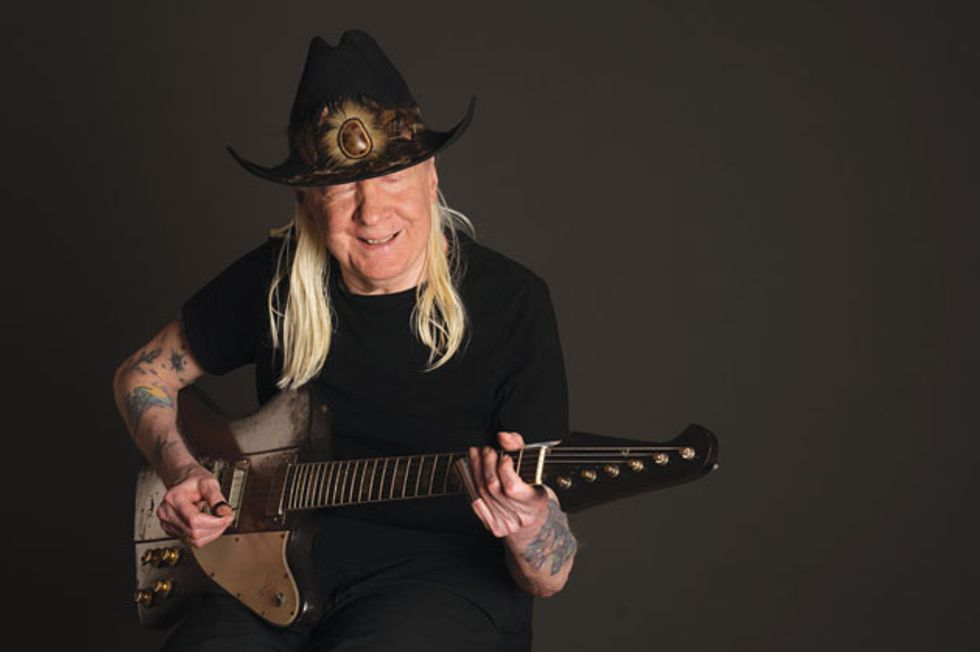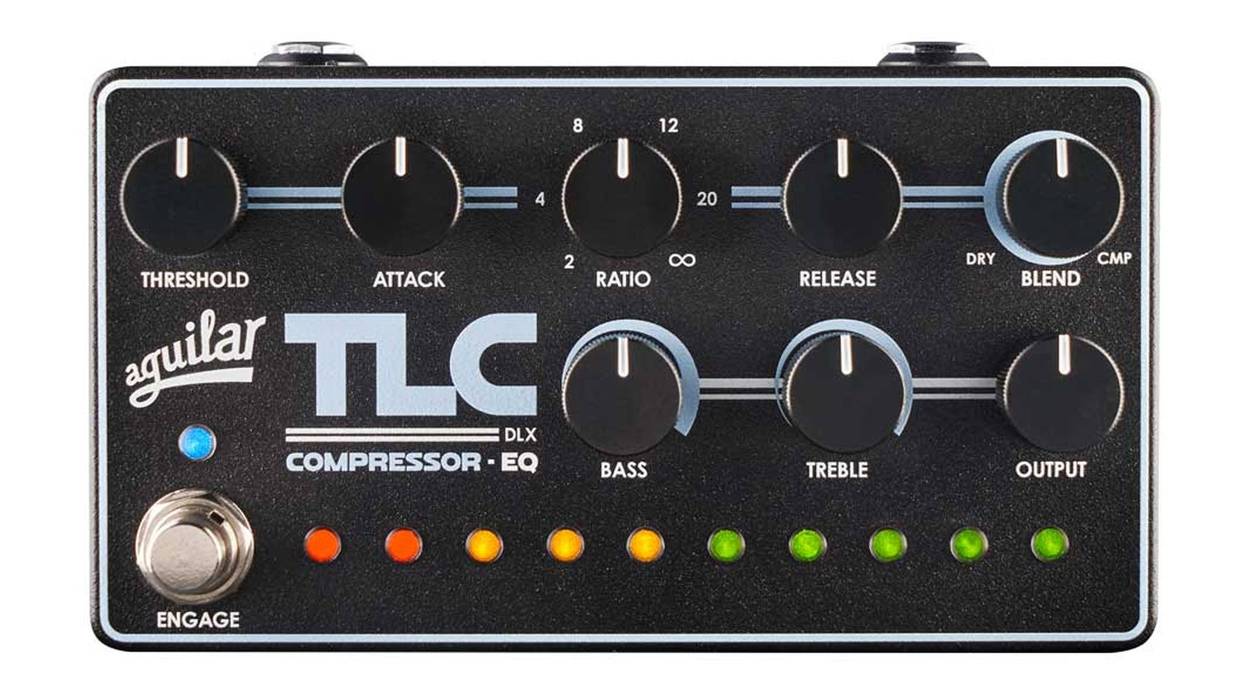On Wednesday, July 16, Texas blues guitar giant Johnny Winter was found dead in his hotel room in Zurich, Switzerland. Known for his stunning slide work and solos that exploded in dazzling fusillades of notes, coupled with his deep devotion to the blues tradition, Winter was 70 years old and enjoying a renaissance in his career, which began in the late 1960s and included a historic performance at Woodstock.
Winter was thoroughly upbeat when he spoke to Premier Guitar last month. His decades-long addiction to methadone was behind him and his back afflictions were improving. He had a busy touring schedule and a documentary about his life, Johnny Winter: Down & Dirty, had debuted at Austin’s South By Southwest Film Festival in March. He’d also just wrapped an album, a guest-star packed set of blues classics called Step Back, that’s set for release on September 2.
“I feel great,” Winter said during the interview. “Physical therapy helps, but so does not taking drugs and drinking.
“Takin’ dope is not good for you,” he added, chuckling.
If there’s one thing Winter was always serious about, it was blues. Growing up in Beaumont, Texas, he was an outcast due to his albinism—a condition he shared with his multi-instrumentalist brother Edgar. And he found connection in the recordings of Howlin’ Wolf, Muddy Waters, and the other bluesmen he heard on the radio, who he saw as kindred souls.
“Most people in Texas didn’t like black people because they were too dark, and they didn’t like me because I was too white,” he said, only half-joking. “That helped me relate to the black experience.”
Winter played with absolute intensity from the start, developing a rapid-fire two-finger picking technique that would become one of his signatures. He got his first guitar when he was 12 and cut his debut single, “School Day Blues,” for a local label at age 15 with his band Johnny and the Jammers. In 1967, when Winter was 23, he recorded his initial album The Progressive Blues Experiment on stage at Austin’s legendary psychedelic blues and rock club the Vulcan Gas Company. The next year he was signed to a deal with Columbia Records after he floored the crowd—and label executives—at the Fillmore East performing his hero B.B. King’s “It’s My Own Fault” as a guest during a Michael Bloomfield and Al Kooper concert. His advance of $600,000 set a recording industry record at the time.
By the end of 1969 the incendiary picker and gravel-throated vocalist had released his major-label debut Johnny Winter and the follow-up Second Winter, and been among the emerging musical heroes at Woodstock, laying out the blueprints for the future of American blues-rock and even Southern rock along the way. Johnny Winter relied mostly on classic blues tunes. His thorny interpretations of numbers like King’s “Be Careful with a Fool” and Sonny Boy Williamson’s “Good Morning Little School Girl” displayed an edgier, more distinctly domestic approach to the music than his British contemporaries. Second Winter offered more original tunes, but began his transition toward rock.
Under pressure from Columbia, Winter added Rick Derringer as a second guitarist and pursued stardom with the influential Johnny Winter And and Still Alive and Well albums in 1970 and 1973. Between those releases he also developed a heroin problem that was quickly replaced by the methadone addiction that would dog him for decades. Those albums, along with the Allman Brothers first titles, cast the die for two-guitar blues-rock ensemble playing. Nonetheless, 41 years later Winter still complained that Derringer played too much and too loud. “All I need to play well is a good strong snare beat and other musicians who don’t get in the way,” he observed.
By 1974 he was a fixture in the consciousness of rock ’n’ roll with his white, wraith-like, often-shirtless frame wrapped around the 1963 Gibson Firebird that still accompanied him onstage during his final performances. Winter’s concert igniting howl “rock ’n’ roll” was already a ritual, and he’d jammed with every famous string-slinger in rock and blues, including Jimi Hendrix and Eric Clapton.
For Winter, however, the highest satisfaction came from the albums he made with blues godfather Muddy Waters in the late 1970s: Winter’s own Nothin’ but the Blues and the Grammy-winning trio Hard Again, I’m Ready, and King Bee that he produced for Waters.
“I had so much fun making those records,” Winter recalled. “I learned pretty much everything from Muddy—from his old records—so I knew exactly what he was going to do, which is why I was so good at producing him. Muddy, Robert Johnson, Son House, and Elmore James got me interested in slide.”
In the ’80s Winter settled into a routine of playing clubs and festivals that he continued until the present, playing 120 or more dates a year. There were high points along the way, like the three albums he recorded for reigning blues independent label, Alligator Records, starting with 1984’s Guitar Slinger, and 1992’s semi-acoustic Hey, Where’s Your Brother?—a nod to Edgar Winter.
Addiction was unkind to Winter. As the ’90s turned into the 2000s, his methadone and alcohol issues sometimes made him seem a shell of his former self onstage. Winter credited Paul Nelson—his friend, manager, second guitarist, and producer, who he met in 2004 — with saving his career and his life.
“I had a good time and enjoyed drugs and drinking,” he said, “but I overdid it. It was great in my 20s. The older I got the worse it was for me. A lot of people I know are dead. I could have died a bunch of times. Maybe I died years ago, but God was on my side.”
In 2011 Winter broke a seven-year recording hiatus with the album Roots, revisiting some of his favorite blues numbers with the help of Warren Haynes, Derek Trucks, Susan Tedeschi, Vince Gill, Edgar Winter, and other heavyweights. The disc was heralded as a partial return to form. This February the four-disc retrospective True to the Blues: The Johnny Winter Story was released, providing a new generation of listeners an opportunity to delve into his fiery early catalog. And his upcoming Step Back is an edgier sequel to Roots, with guest appearances by Eric Clapton, Leslie West, and Billy Gibbons, to name a few.
Winter had a few unscratched items on his bucket list. He told Premier Guitar that he wanted to win a Grammy for an album of his own. He also wanted to write more original tunes, which he hadn’t done for over a decade. He hoped for induction into the Rock ’n’ Roll Hall and Fame, and wanted to travel to Egypt to see the pyramids. He also wanted to be remembered as a torchbearer for the music he loved, remarking that he hoped his name was synonymous with “good blues.”
“The music reflects me, of course,” he said. “I play what makes me feel good, and I’m interested in sharing that feeling with other people.”


















![Rig Rundown: Russian Circles’ Mike Sullivan [2025]](https://www.premierguitar.com/media-library/youtube.jpg?id=62303631&width=1245&height=700&quality=70&coordinates=0%2C0%2C0%2C0)
















![Rig Rundown: AFI [2025]](https://www.premierguitar.com/media-library/youtube.jpg?id=62064741&width=1245&height=700&quality=70&coordinates=0%2C0%2C0%2C0)











